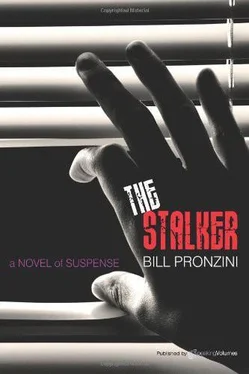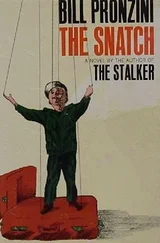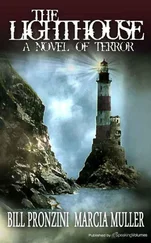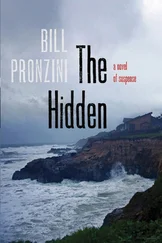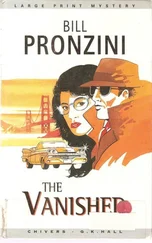Bill Pronzini - The Stalker
Здесь есть возможность читать онлайн «Bill Pronzini - The Stalker» весь текст электронной книги совершенно бесплатно (целиком полную версию без сокращений). В некоторых случаях можно слушать аудио, скачать через торрент в формате fb2 и присутствует краткое содержание. Жанр: Старинная литература, на английском языке. Описание произведения, (предисловие) а так же отзывы посетителей доступны на портале библиотеки ЛибКат.
- Название:The Stalker
- Автор:
- Жанр:
- Год:неизвестен
- ISBN:нет данных
- Рейтинг книги:4 / 5. Голосов: 1
-
Избранное:Добавить в избранное
- Отзывы:
-
Ваша оценка:
- 80
- 1
- 2
- 3
- 4
- 5
The Stalker: краткое содержание, описание и аннотация
Предлагаем к чтению аннотацию, описание, краткое содержание или предисловие (зависит от того, что написал сам автор книги «The Stalker»). Если вы не нашли необходимую информацию о книге — напишите в комментариях, мы постараемся отыскать её.
The Stalker — читать онлайн бесплатно полную книгу (весь текст) целиком
Ниже представлен текст книги, разбитый по страницам. Система сохранения места последней прочитанной страницы, позволяет с удобством читать онлайн бесплатно книгу «The Stalker», без необходимости каждый раз заново искать на чём Вы остановились. Поставьте закладку, и сможете в любой момент перейти на страницу, на которой закончили чтение.
Интервал:
Закладка:
He stopped and stood there on the porch for a long moment, with the snow falling around him and his breath making little puffs of vapor on the cold air, staring at her frankly and openly, and finally she seemed to become aware of his eyes through the glass and lifted her head and looked at him briefly, the smooth skin of her forehead wrinkling into two thin horizontal lines and the smile turning quizzical, lingering; but then she looked back to the blond guy again, and in his mind it was as if she had forgotten him, negated his existence with that simple averting of her eyes, and he went to the door and opened it and walked in and went straight to the booth and stood there looking down at her.
“My name is Steve,” he said. “Steve Kilduff.”
Her forehead wrinkled again, and the same quizzical, curious smile came onto her pink lips. “Hello,” she said uncertainly.
The blond guy looked up at him with open hostility. His cheeks were pinkish-red, too, but on the table were two empty hot-buttered-rum mugs from the café’s connecting bar, which had more to do with his color than the interior warmth. His eyes had a faint opaqueness, the whites interwoven with crimson lines. He said, “Flake off, McDuff.”
“ Kil duff.”
“Whatever the hell,” the blond guy said. “Flake off.”
He kept looking at her, at her great luminous black eyes. “What do you say? Do you want me to leave?”
“I . . . don’t know,” she answered. “I don’t know you.”
“I’m Steve,” he said. “Steve Kilduff, from San Francisco.”
“Listen,” the blond guy said, “nobody invited you. This is a private discussion.”
“Oh, Kjel,” she said. “Don’t be like that.” And to him, “I’m Andrea Fraser; and this is Kjel Andersson,” smiling.
“Oh, a Swede,” he said.
“What the hell do you mean by that?” Andersson asked hotly.
“I didn’t mean anything by it.”
“No?”
“No.”
“Please, Kjel,” she said. “Don’t make a scene.”
“For Christ’s sake!” Andersson said, looking at her. “Whose side are you on?”
“I’m not on anyone’s side.”
“Tell him not to make a scene, then.”
“He isn’t raising his voice,” she said, and there was the barest hint of anger in her tone now.
“Well, maybe you’d like me to flake off.”
“Yes, maybe I would.”
“All right, then, goddamn it!” Andersson said petulantly and slid out of the booth and glared angrily at Kilduff. He stalked to the door and went out.
He looked down at her and said very softly, “Would you mind if I sat down with you, Andrea?”
“Well . . . no, I guess not.”
He sat down and kept looking at her, tasting her with his eyes, and inside him there was a paradoxical mixture of feelings old and new, intermingling as one: he felt an intense surging in his loins of sheer physical desire—he wanted her, he wanted her body as he had never wanted the body of any other woman; and yet he was consumed equally by a kind of fatherly-brotherly selfless knight-errantry that in itself precluded physical contact.
He said, “Listen, is Andersson anything to you?”
“What do you mean?”
“Fiancé or boyfriend, like that?”
“No, he’s just a fellow I work with. At Prudential Life, in Oakland. We came up last night as part of a group, on a chartered bus for the weekend; but Kjel drinks too much, he really does, even this early in the day, and—”
He leaned forward. “Will you have dinner with me tonight?”
She blinked. “Pardon me?”
“Will you have dinner with me tonight?”
“Well, I . . .”
“There’s a roadhouse a couple of miles from here;” he said. “You buy your steaks by the pound and cook them yourself over wood charcoal. Do you like jazz? Gutbucket, with a lot of soul horn?”
“Yes, but . . .”
“We can go to Richie’s afterward, on Interstate 40. It’s a wild place. When you walk in, you feel like you’ve regressed forty years, to Bourbon Street in the twenties, if you know what I mean. What do you say, Andrea? Seven o’clock?”
She touched the tip of her tongue to her lips, and held it there, as a cat will do sleeping, and her eyes locked with his, probing, touching, and after a very long time—unsmiling now, eyes still locked—she said softly, “Yes, seven o’clock, Steve.”
They were married in San Francisco five weeks later . . .
Kilduff lay on the unmade bed in the Twin Peaks apartment chainsmoking, with the hammered-bronze ashtray balanced on his chest, reliving it as vivid as yesterday, hearing her voice, seeing her so perfect and so innocent sitting there in the booth; and that night, all in soft blue ski clothes, and the touch of her lips for the first time—sweet, chaste, trusting, warm; and later, in San Francisco, at the Top of the Mark and the Venetian Room and that little place in the Russian colony on Clement, music soft and lights soft and the feel of her in his arms; and still later, the first whispered words from his lips under a so-corny gibbous moon, “I love you, Andrea,” and her reply, breathless, a little awed, “Yes, oh yes, Steve, and I love you!”
Halcyon days, the days of wine and roses . . .
Viciously, now, Kilduff ground out his cigarette in the bronze ashtray and swung his feet down and went into the kitchen. All gone, all dead, long dead—Jesus, why am I thinking about her like this? Why now, especially why now? He opened the refrigerator, a mechanical gesture, and looked inside: full larder, full to overflowing. She’d probably gone shopping before she left; that was the way Andrea was—walk out with a man’s guts in her hands, dripping, but make sure he has enough food in the refrigerator. He slammed the door, turning.
Andrea, Andrea, I need you .
He stopped. No! Goddamn it, Kilduff, no, it’s over, it’s finished; she ran out, didn’t she? The money ran out and she ran out, you don’t need her, she’s destroyed your love, you don’t need her, you—don’t—need—her.
Into the living room. The drapes were drawn, and it was dark in there. The rain came down in a soft, steady cadence on the balcony outside, and the wind tugged gently at the weather stripping around the glass doors, calling out. He held his right hand up to his eyes, and the hand trembled; he let it fall and returned to the bedroom and lay on the bed again.
What am I going to do? he asked of himself silently—the same question he had been asking of himself since yesterday morning, since Drexel had revealed to him in that coffee shop in Sebastopol what he was planning. But there was no answer now, either. He was caught in a vise, in one of those medieval iron maidens, caught in the middle with only two ways to go, with only two choices, no more and no less.
The police.
Or a party to murder.
No middle road, no tightrope line—one or the other. But which one? Could he walk into the Hall of Justice and into the Detective Bureau and say, “I’m one of the six men who robbed the Smithfield Armored Car in Granite City, Illinois, eleven years ago,” could he walk in there and say that? But could he condone murder, passively allow Drexel to kill Helgerman in cold blood even though it was Helgerman’s life or theirs? Yet he had to do one of the two, he had to make the decision, and soon, soon...
Suddenly, he sat upright on the bed with his heart plunging in his chest, and cold marrow fear, a different fear now, flowed through him like warm oil. Oh God! he thought, oh God! Because he didn’t know if he could choose, he wasn’t at all certain he could make that decision; because there was an added dimension now, you see, something he had refused to comprehend before; because he understood with cold, complete clarity why he had been thinking about Andrea and why he needed her in spite of his self-deception that he did not; because in that moment Steve Kilduff realized exactly what he had become.
Читать дальшеИнтервал:
Закладка:
Похожие книги на «The Stalker»
Представляем Вашему вниманию похожие книги на «The Stalker» списком для выбора. Мы отобрали схожую по названию и смыслу литературу в надежде предоставить читателям больше вариантов отыскать новые, интересные, ещё непрочитанные произведения.
Обсуждение, отзывы о книге «The Stalker» и просто собственные мнения читателей. Оставьте ваши комментарии, напишите, что Вы думаете о произведении, его смысле или главных героях. Укажите что конкретно понравилось, а что нет, и почему Вы так считаете.
